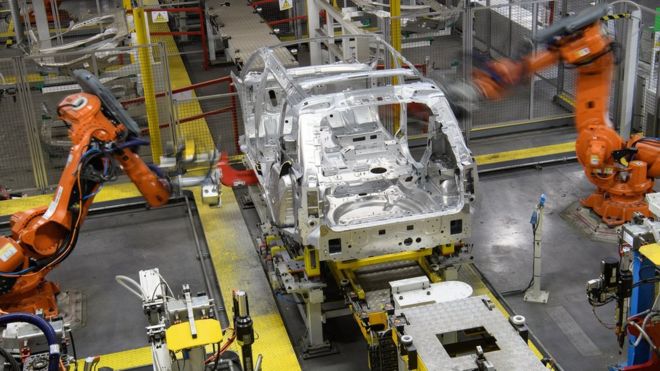
Advanced digital technology could give UK manufacturing a huge boost and create hundreds of thousands of jobs, a new report claims.
The independent review, chaired by the head of Siemens UK, highlights the benefits of robotics, 3D printing and artificial intelligence.
But Juergen Maier said the UK needed "greater ambition" to take advantage of such technology.
And he said a huge number of workers would need to be retrained.
His report calls for a commission to help businesses adjust to changing technologies.
The report, Made Smarter, brought together executives from companies such as Rolls Royce, GKN and IBM, with representatives from small firms as well as academics from the universities of Newcastle and Cambridge.
Its recommendations will help inform the government's industrial strategy plans.
Professor Maier told the BBC's Today programme the transition would mean job losses: "On the one hand it is going to create productivity and more exports and through that we can create more jobs but at the same time robotics and artificial intelligence will displace some jobs.
"The best thing we can do is to make ourselves ready for it in a very proactive way and that means training our people... we need to up skill one million existing workers in the industrial and manufacturing sector... so they can transition from tasks that might be displaced to, for example, managing or programming robots."
The report proposes:
- More targeted support for companies, re-skilling workers, and a National Adoption Programme piloted in the north west
- Five digital research centres to improve innovation and capability
- A national commission in charge of turning Britain into a global leader in industrial digital technologies
The proposals were backed by CBI director-general Carolyn Fairbairn, who warned about the UK's international competition.
"The UK must compete with China, the USA and much of Europe where there are already advanced plans to embrace the fourth industrial revolution," she said.
Sean Redmond, chief executive of software firm Vertizan and a contributor to the report, said the UK needed to "catch up with international competitors".
"Smaller businesses that are growing at scale, especially industrial companies, need support learning about how digitalisation can help their business grow," he said.


